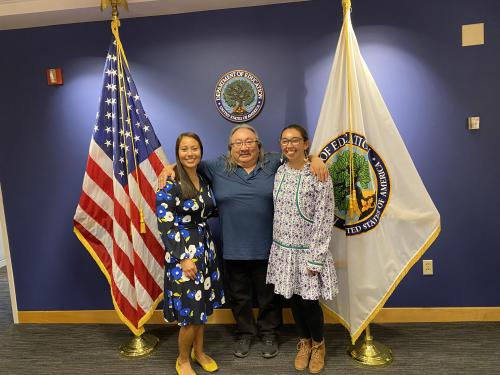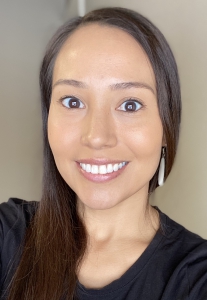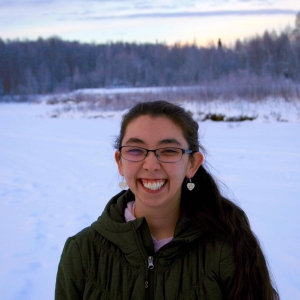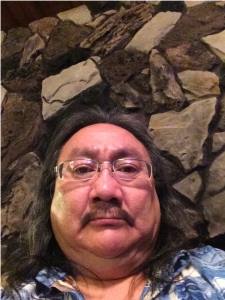Meet the 2022 Arctic Indigenous Scholars
Three Arctic Indigenous Scholars were selected in 2020 by a seven-member volunteer selection committee. Their trip to Washington DC, originally scheduled for May 2020, was delayed due to COVID-19 related travel concerns until fall 2022. The three scholars traveled to Washington, DC to meet with decision and policy-makers during 26–30 September 2022.

Naidene Baechler

Naidene Baechler is a Mental and Behavioral Health Coordinator with the Matanuska-Susitna Borough School District where she provides services district-wide. She graduated with her Master of Social Work degree from the University of Alaska, Anchorage in May 2020. Prior to her current position, she was a Program Supervisor for Knik Tribe where she was part of a small team to develop and start a behavioral health clinic in Palmer. She is a member of Newhalen Tribal Council in Newhalen, Alaska, where she spent most of her childhood years prior to being raised in Nevis, Minnesota. Naidene obtained her Bachelor of Arts degree in Human Services from the University of Minnesota, Morris in 2008. Upon graduating, she returned to Newhalen to pursue a career working with Alaska Native youth.
Naidene hopes to continue her advocacy work by engaging in reciprocal learning with federal stakeholders on resolving complex social issues Alaskans face: high suicide mortality rates and preventative measures through mental health services in education.
Kimberly Pikok

Kimberly Kivvaq Pikok is an Iñupiaq from Utqiaġvik, Alaska. She graduated from the University of Alaska Fairbanks (UAF) in 2021 with her Bachelor of Science in Wildlife Biology and Kimberly is now a Master’s student at UAF in the Interdisciplinary Studies program, researching how to engage Indigenous youth in wildlife co-management organizations and using local hunter and whaler observations to determine the seasonal changes in Utqiaġvik’s spring whaling. During her time at UAF, being in the graduate student researcher role for the Alaska Arctic Observatory and Knowledge Hub, and her summers working at the North Slope Borough Department of Wildlife Management, Kimberly learned how important it is to have Indigenous people involved in all aspects of research and decision-making. With the skills she is learning from these experiences and opportunities, she plans to incorporate them into her future career back at home.
Read Kimberly's article, Creating Institutional Changes to Improve Indigenous Students' Learning Experiences, published in Witness Community Highlights!
Richard B. Slats

Richard B. Slats is a Cup’ik from Chevak, Alaska. He is bilingual with English as his second language. His secondary education has been with the University of Alaska Fairbanks; Western Oregon State College, and he received his AA degree from the UAF Kuskokwim Campus in Rural Human Services. He is a lifelong subsistence hunter and fisher. A second Chief for the Chevak Native Village, currently he is a member of the Chevak Company Corporation Board of Directors. He is also an Executive Committee Member of the Bering Sea Elders Group. He is serving his second year of the Yukon Kuskokwim Subsistence Regional Advisory Council. He has been appointed to the North Pacific Fisheries Management Council’s Fisheries Ecosystem Plan Task Force to develop protocols and guidelines for applying local knowledge and traditional knowledge for the Council's Fisheries Ecosystem Plan.
Life between two worlds has been lived; it has been said that one could never go back to how it really was and live it a full 100%. In one hand the western world has brought with it great benefits of easy living but it has also brought disease, great death, social ills, breakup of culture and history; and continues to do this to this day. A modern-day subsistence user has to continually fight to use the natural resources and the environment that was bestowed to them by the creator and their lives inherited from their fore-fathers.
Topics to speak about in Washington DC:
- Climate Change
- Open Pit Mines
- Tribal Rights
- Current Events for the Subsistence User(s)
Washington, D.C. Meeting Hosts
Thank you to the following organizations for hosting 2022 Arctic Indigenous Scholars: Smithsonian Arctic Studies Center, National Science Foundation, Senator Lisa Murkowski, Senator Dan Sullivan, US Department of Education, US Bureau of Indian Education, and the US Environmental Protection Agency.
2020 Volunteer Selection Committee
Rosemary Ahtuangaruak, 2018 Arctic Indigenous Scholar, Nuiqsut, AK
Percy Ballot, Maniilaq Association, Buckland, AK
Raychelle Daniel, The Pew Charitable Trusts, Washington, D.C.
Nicole Kanayuraq, North Slope Borough, Utqiaġvik, AK
Theresa Arevgaq John, University of Alaska Fairbanks, 2018 Arctic Indigenous Scholar, Anchorage, AK
Gay Sheffield, Alaska Sea Grant, Nome, AK
Inuuteq Stotts, ASRC Energy Services Alaska, Inc., Anchorage, AK
For any questions regarding the project or application process, please contact Lisa Sheffield Guy, Arctic Indigenous Scholars Project Manager, at lisa [at] arcus.org or 907-474-1600.
